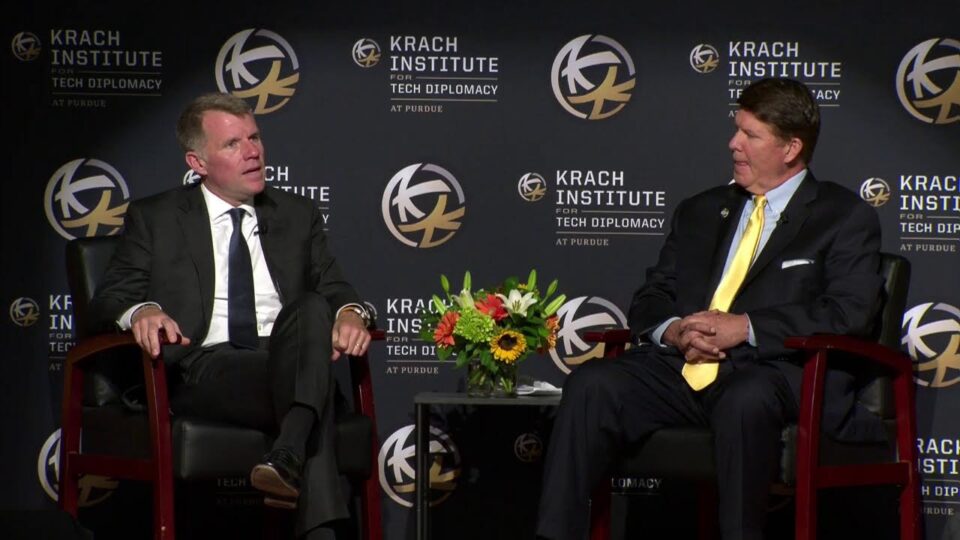Nathaniel C. Fick
Ambassador at Large for Cybersecurity and Digital Policy (CDP)
Nathaniel C. Fick was sworn in on September 21, 2022 as the inaugural U.S. Ambassador at Large for Cyberspace and Digital Policy.
Prior to joining the State Department, Ambassador Fick was a technology executive and entrepreneur. He was CEO of the cybersecurity software company Endgame from 2012 through its acquisition by Elastic in 2019. Thereafter, he led Elastic’s information security business globally. Ambassador Fick spent nearly a decade as an operating partner at Bessemer Venture Partners, working with management teams to build technology businesses. In 2018, he was named by Fast Company magazine as one of the “100 Most Creative People in Business,” and Endgame was selected by Forbes as one of the “100 Best Cloud Companies in the World.”
From 2009 to 2012, Ambassador Fick was CEO of the Center for a New American Security, a national security research organization in Washington. Earlier in his career, he served as a Marine Corps infantry and reconnaissance officer, including combat tours in Afghanistan and Iraq. His book about that experience, One Bullet Away, was a New York Times bestseller, a Washington Post “Best Book of the Year,” and one of the Military Times‘s “Best Military Books of the Decade.”
Ambassador Fick graduated with high honors in Classics from Dartmouth College and holds an MPA from the Harvard Kennedy School and an MBA from the Harvard Business School.
Bureau of Cyberspace and Digital Policy
The Bureau of Cyberspace and Digital Policy (CDP) promotes U.S. national and economic security by leading, coordinating, and elevating foreign policy on cyberspace and digital technologies. It builds partnerships to shape the international environment so Americans and people everywhere can prosper. CDP strives for a world in which every person can access the opportunities that come with digital connectivity to build thriving economies and societies and works to counter challenges to this vision from authoritarian states.
Keith Krach
Former U.S. Under Secretary of State
Chairman & Co-Founder, Krach Institute for Tech Diplomacy at Purdue
Keith Krach currently serves as the Chairman of Krach Institute for Tech Diplomacy at Purdue University, and Co-Chairman of the nonpartisan Global Tech Security Commission. He most recently served as Under Secretary of State leading America’s economic diplomacy and having the rare distinction of being unanimously confirmed by the U.S. Senate.
As the nation’s top economic diplomat, Krach led the development of the bipartisan Global Economic Security Strategy; built the Clean Network Alliance of Democracies–defeated CCP’s 5G masterplan; spearheaded the TSMC onshoring in which resulted in $350B investment in domestic semiconductor manufacturing; primary architect for the bipartisan $280B CHIPS and Science Act; drove divestment in CCP companies to protect investors from unknowingly funding CCP military; championed the human rights by mobilizing action against CCP’s genocide in Xinjiang; and bolstered U.S.-Taiwan ties as the highest-ranking State Department official to visit in 41 years. As a result, Krach and his family were sanctioned by the CCP.
Krach served as DocuSign Chairman & CEO for 10 years; Ariba co-founder, Chairman & CEO; Chairman of Purdue’s Board of Trustees; Angie’s List Board Chairman; founder of the Global Mentor Network; 2000 E&Y National Entrepreneur of the Year, 2019 Harvard Business School Leader of the Year and youngest-ever Vice President of GM. Krach holds a B.S. and Honorary Doctorate in Engineering from Purdue, and MBA from Harvard.
Krach Institute for Tech Diplomacy
The Krach Institute for Tech Diplomacy at Purdue is the world’s preeminent trusted technology accelerator. As the leader of a new category of Tech Diplomacy, the Institute integrates technology expertise, Silicon Valley strategies, and foreign policy tools to build the Global Trusted Tech Network of governments, companies, organizations and individuals to accelerate the innovation and adoption of trusted technology and ensure technology advances freedom.
